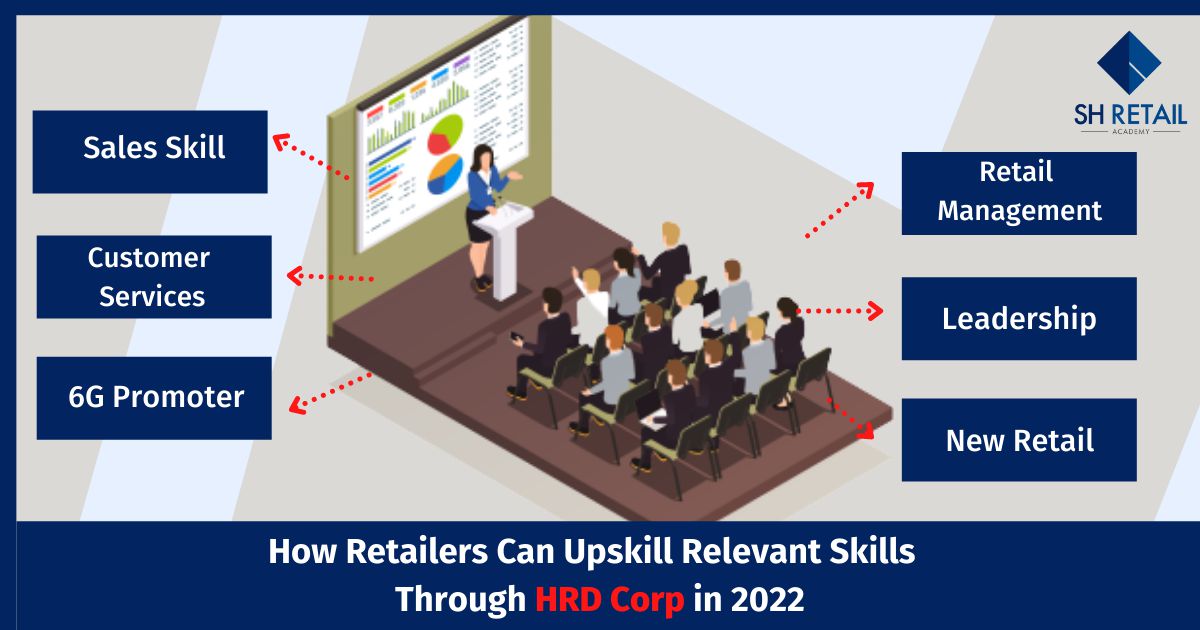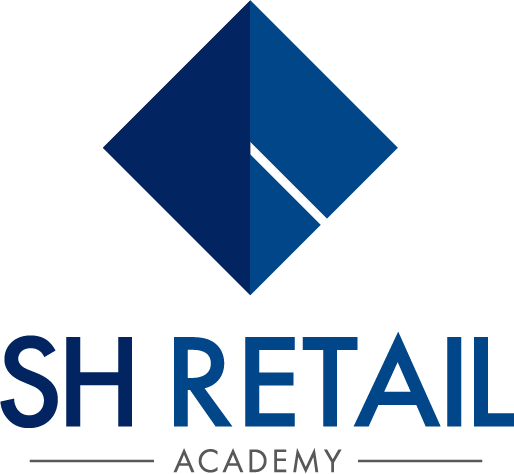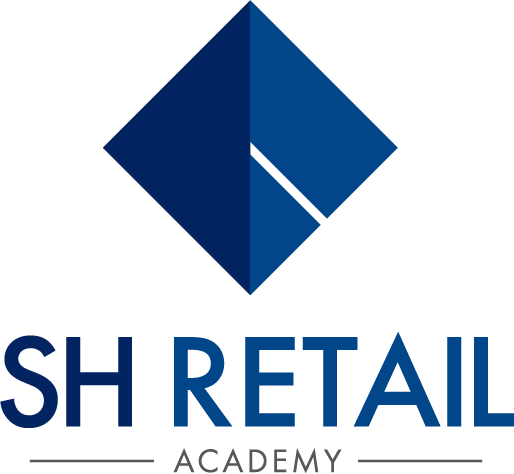
27 May How Retailers Can Upskill Relevant Skills Through HRD Corp
Previously HRD Corp was known as HRDF but since March 2021, it has been rebranded. The jurisdiction of the Pembangunan Sumber Manusia Berhad Act 2001 (PSMB Act 2001) has been increased to include all industries as of the first day of March 2021 by Malaysia’s Human Resources Development Fund (HRD Corporation).
In addition to contributing to the overall development of Malaysia’s human capital, the expansion will assist in boosting the number of skilled local workers who are responsive to corporate needs, with the Ministry of Human Resources spearheading the initiative. In other words, all industries, with the exception of the federal and state governments, are expected to contribute to the Human Resources Development tax and will be covered by the HRD’s training programmes. Let’s take a deeper look into HRD Corp and how it can benefit you.
How Retailers Can Upskill Relevant Skills Through HRD Corp
- What is HRD Corp
- Retail Industries Under HRD
- Overall Training Fee of Retail Programs
- Employers Feedback on Skills Demanded in Retail Industry
- Training Programs Claimable Under HRD
1. WHAT IS HRD
Human Resource Development Fund (HRD Corp) is a government organization under the Ministry of Human Resources, which is generally recognized as Pembangunan Sumber Manusia Berhad Act 2001. According to the PSMB Act 2001, the implementation and collection of a human resources development levy for the intention of enhancing the training and development of employees, apprentices and trainees, the establishment and administration of a Human Resources Development Fund by the Corporation, and for matters connected therewith are the primary objectives of the Act. In accordance with their objective, HRD Corp delivers training and up-skilling initiatives to major industries in Malaysia, enabling them to stay up with the rapidly changing retail landscape and the aspirations of their respective companies.
Moreover, there is also a term called HRD levy which is the 1% of the total salary of the employees (If your company falls under the purview of the legislation, you are required to register with HRD Corp and to make monthly contributions to the HRD levy. Registered employers are required to pay a levy charge equal to one percent of each employee’s monthly wage. Employers who choose to register under the optional category, on the other hand, will be required to pay 0.5 percent of each employee’s monthly wage.) The formula to calculate HRD levy is as follows:
HRD levy = HRD levy % x ( Basic Salary + Fixed Allowances)
All HRD levy payments must be made no later than the 15th day of the following month. The levy for March 2021, for example, must be paid on or before April 15, 2021. In addition, according to the PSMB Act 2001, an employer that fails to register with HRD Corp faces a fine of up to RM10,000 or a year in prison, or both, if found guilty. Those with ten or more Malaysian employees must register, while companies with five to nine Malaysian employees are not required to do so.
2. RETAIL INDUSTRIES UNDER HRD
There are a number of reasons why the retail industry is covered under HRD, where it aims at strengthening the abilities and capacities of retail through distinguishment of:
- Skills
- Competencies
- Potential career progression
- Career benefits
- Salary range
- Preferred qualifications for career mobility
- Malaysia Standards Industrial Classifications (MSIC) categories
It is also categorized under specialized and non-specialized stores where they covered 7 departments with 34 job positions and 5 departments with 18 job positions accordingly. The focus areas are as follows:
- Retail Operations
- Customer Care
- Visual Merchandising
- E-Commerce
- Marketing & Branding
- Merchandising & Receiving
- Sales & Marketing
- Management
3. OVERALL TRAINING FEE OF RETAIL PROGRAMS
As for the overall training fees, there are allocated fees per pax approved for different industries, which are divided into three categories. The table below shows the fees ranked from highest to lowest:
| Highest Cost |
|
| Medium Cost |
|
| Lowest Cost |
|
Source: HRD Corp Industrial Insights Report
Other than that, employee training in the retail industry focuses on interpersonal skills such as promoting, assisting, and tending to customers’ inquiries, as well as technical abilities. Retailers who pay high training costs place a strong focus on practical expertise and extended training hours. Another table below shows the skill area of training places along with its financial assistance (from highest to lowest in demand and amount).
| Training Places | Demand | Financial Assistance |
| Retail / Merchandising | 1,699 | RM 878,350 |
| Education / Training | 331 | RM 103,490 |
| Safety and Health | 276 | RM 100,340 |
| Supervisory | 81 | RM 99,115 |
| Process and Operation | 77 | RM 68,360 |
Source: HRD Corp Industrial Insights Report
Based on the table above, Retail or Merchandising is the most in-demand skill in 2020, according to Training Places. These abilities are aimed at attracting new customers, persuading existing customers to buy more, increasing impulse sales, and raising customer awareness of product lines. Education or Training, as well as Safety and Health, came in second and third, respectively. When it comes to financial aid, a large share of the RM 878,350 in financial assistance put into the Hypermarket / Supermarket / Departmental Store skill areas went to Retail or Merchandising (58 percent). Supervisory and Safety and Health positions, on the other hand, each accounted for 7% of the total.
4. EMPLOYERS FEEDBACK ON SKILLS DEMANDED IN RETAIL INDUSTRY
Furthermore, working in the retail industry is generally related with exposure to retail management and customer service, according to the Training Needs Survey 2019. Employees of all skill levels play a critical role in ensuring that a retail organization operates at maximum capacity, serves its target customers, and connects back-end operations with front-end activities. The table below shows the type of skills (technical and non-technical) needed for different levels of workers.
| Level | Technical Skills | Non-Technical Skills |
| Skilled Worker |
|
|
| Semi-Skilled Worker |
|
|
| Low-Skilled Worker |
|
|
Source: HRD Corp Industrial Insights Report
5. TRAINING PROGRAMS CLAIMABLE UNDER HRD
For your information, a number of training programs in the retail industry are claimable under the HRD Corp. The list is as follows:
- Retail Management
- New Retail
- Sales Skills
- Customer Service
- Leadership
- Management
- Personal Development for Retailers
Relevant training programmes must begin within six (6) months of the filing of training grant applications, and training claim applications must be made within six (6) months of the completion of the training programmes.
In SH Retail Academy, we combine application successes that are time-proven from Senheng with the latest knowledge and concepts to bring effective retail industry training programs for companies in Malaysia. Beginning from the formulation of our training program outlines, content and delivery methods; each process is derived using retail thought process and retail needs. Should you need any assistance, be it offline or online, we’ve got you covered with more valuable tools.
Find out more and kick start your journey today by reaching out to us here.
(All sources from this article were taken from HRD Corp Official Portal)
4,000 total views, 1 views today


